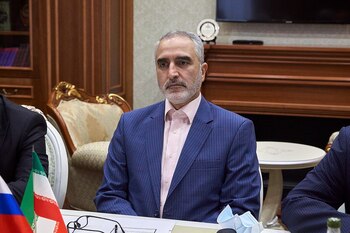
Nicolás Maduro, the dictator of Venezuela, thinks he feels some relief. The price of oil remains at high levels thanks to the brutal invasion that his partner Vladimir Putin ordered in Ukraine on February 24. Thus, its main resource could give respite to the rickety local economy with which it impoverished almost the entire population. In 2022, production grew to 800,000 barrels a day and he thinks this will be the best year in the sector in a long time. It also owes it, in part, to another of its allies: Iran, the country expert in oil trafficking with ghost ships.
The carnal union proposed by both regimes is not motivated by love, but by money. In Iran they believe that Chavista officials are making “too many mistakes” and “too clumsy” in handling the oil crisis itself. However, the aversion is reciprocal. Venezuelan technicians and engineers - mainly from PDVSA - who stay away from politics know that they have enough experience to exploit the resources of their land as they have been doing for decades. They consider that the shady business, traffic, scandalous corruption since Hugo Chávez's time, sanctions and political mismanagement at the Miraflores Palace have undermined their professionalism to the extent of “importing” know-how.
From that country delegations of technicians arrive in Caracas in full Conviasa planes to “advise” Venezuelan engineers. The most important of these flights occurred at the end of January, when it brought high-level officials from Iran to Venezuela to negotiate on several fronts at the same time.
None of this is free. Tehran does not charge in dollars, much less in bolivars. Nor is it in Petro, Maduro's cryptocurrency. He prefers to load his tankers with hundreds of thousands of barrels and then resell on black markets at a much more convenient price. The intercontinental task is managed by three key areas of the theocratic regime: the Ministry of Petroleum, the Ministry of Defense and Logistics and, fundamentally, the Islamic Revolutionary Guard of Iran. Each of these departments send their referents who enjoy some extra privilege during their visits. Small Caribbean licenses.
On behalf of Javad Owji - the sanctioned Iranian Minister of Oil - is Ali Akbar Purebrahimi. His boss has been in the crosshairs of the United States Treasury since November 2020 and his resume is broad in the state crude industry: he is an engineer expert in sweeping natural resources and avoiding financial warnings. He also enjoys the benefit of being known for years by Ayatollah Ali Khamenei. Purebrahimi frequently visits the Latin American nation and gives orders that are fulfilled in detail by his Chavista peers. All his movements - or almost all - are officially communicated to his superior who in turn reports the progress to the spiritual leader and head of state, Ebrahim Raisi.
But he is not Khamenei's only envoy to “save” Maduro.
Hojjatollah Ghoreishi is another key player. Some in Venezuela insist on laughingly calling it Midas. It's because of his supposed ability to turn everything into gold. Or in other words: he is responsible for obtaining Venezuelan gold for the coffers of his country. He is the Deputy Minister of Defense and Logistics of the Armed Forces. It is a key link in the Quds Force, the elite of the Revolutionary Guard operating abroad. He is the one who provides them with the necessary foreign exchange so that their missions in Syria, Yemen and Iraq can be solved. Ghoreishi is a true trader. It transforms profits earned by domestic petrochemical companies into foreign exchange through Turkish banks. Gold has a mixed use: a few hundred kilos return to Tehran, the rest is also reconverted. Recep Erdogan's multiple games.
But perhaps the least known of Iran's three delegates to Venezuela is Azim Monzavi. He is commander of a specific - and secret - unit of the Islamic Revolutionary Guard that deals with oil trafficking in various black markets for the Quds Forces. His name is almost unknown to Venezuelans and few in Maduro's circle know him. This powerful member of the Ayatollah army is responsible for selling the crude oil that his institution obtains from PDVSA and thus being able to put into operation the sleepy Venezuelan oil machinery.
The Iranian transaction to its Latin American partners is based above all on three key points: theocracy engineers provide technical assistance to Venezuelans to develop refineries that have fallen into disuse in recent years in exchange for millions of barrels of oil. Together with the Revolutionary Guard for investment in new crude oil extraction structures in exchange for the harvest of profits. Finally, the purchase of weapons would also be at stake. The Bolivarian Armed Forces seem dazzled by Iranian drones that would enter commercial exchange despite the sanctions imposed on both administrations.
In addition to these three key officials, other members of the Islamic regime flew to Caracas. These include: Seyeed Moosavi, Naghi Fazelian, Hamid Reza Hosseini Javad, Mehdi Pahastari, Mohammad Zohrei, Poei Mehr and Seyed Hamed Naseri. Their functions vary according to the ministry or force to which they respond. Although their objectives are, in short, identical: to keep as much Venezuelan oil and gold as possible.
KEEP READING:
Últimas Noticias
Debanhi Escobar: they secured the motel where she was found lifeless in a cistern

The oldest person in the world died at the age of 119

Macabre find in CDMX: they left a body bagged and tied in a taxi
The eagles of America will face Manchester City in a duel of legends. Here are the details

Why is it good to bring dogs out to know the world when they are puppies




